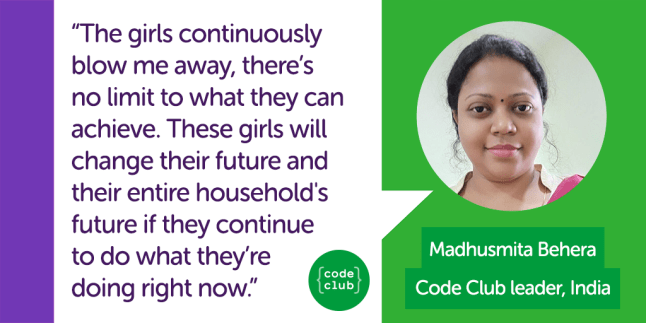We asked the Code Club team and friends to share their favourite Python projects and why you should give them a go in your club. There is a perfect project for everyone, from beginners to more experienced coders.
Why Python?
Python is the perfect next step from the block-based programme language, Scratch. It has a simple and easy-to-learn syntax (the structure of statements in a computer language), it is user-friendly and readable and is used by software developers across the world — which makes it perfect for Code Club members to explore!
To get your Code Club members started with Python, all you need is a computer or mobile device and Trinket which lets you run and write code. You’re then ready to dive into our Python projects.
Moving on from Scratch to Python
‘Target practice’ is the second project in our ‘Introduction to Python: Variables, functions, and loops’ project path and provides a great starting point for getting stuck into learning Python.
“One of my favourite Scratch projects within my code club has always been archery. To have a Python project that replicates that using text-based code is an excellent way for the attendees of my club to make the transition from block-based coding.”
Darren Bayliss, Seir Kieran Code Club and Kinnitty National School, Ireland
Be still my beating heart!
Getting that “Aha!” moment can really encourage a young person to explore Python further.
Learn more about getting started with MicroPython, a Raspberry Pi Pico, and the ‘Beating heart’ project.
“This was my first project using a Raspberry Pi Pico and MicroPython, and I had a real sense of achievement when I made the LED light up! This is a great way to show the ‘real world’ impact of your code, and a fun way to continue your Raspberry Pi Pico progress.”
Isabel Ronaldson, Global Programme Coordinator
Make a face and share it with the world!
Experimentation is an important part of learning, which is why ‘Make a face’ is the perfect project to get creative with code and discover how you can use Python to explore generative arts.
“I love the way you can make art with code in this creative project! It’s a great way to understand the design process, as well as showing how code can be super creative. Every project creates a completely unique coded face, which young people could enter to the Coolest Projects showcase, to share their creativity with the world!”
Helen Gardner, Coolest Projects Manager
Creating secure passwords
Initiating online safety discussions with your Code Club is important, so try using the Python project ‘Password generator’ as a conversation starter!
“All the children in my club understand the importance of a strong password, but quickly run out of inspiration for creating them. They really understand the use of this project! I like it because it is easily simplified or split into sections for different pupils or times available.”
Tamasin Greenough Graham, St Paul’s C of E Primary School, England
Explore our free educational project paths
Whether your Code Club is just starting out with Python or is looking to explore other coding languages, we have something for you.
You can find all the Code Club classics on our projects webpage or explore the project paths, where coders are guided through new coding and design skills to make things that matter to them.
Have we missed your favourite Python project off our list? Share it with us on Twitter, using the hashtag #MyCodeClub.










You must be logged in to post a comment.